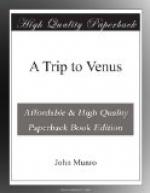“Sure to be,” replied Gazen. “He never misses an opportunity of attacking me. ’Tis the nature of the animal. But I flatter myself I shall get the laugh on him this time.”
The hall was full. The hearty welcome of the Fellows showed their high appreciation of Professor Gazen, and made me feel quite proud of his acquaintance. They listened to his discourse on the movements of Venus, and his new hypothesis, with all the solemnity of a Roman senate deliberating on the destiny of a nation. When he had finished in a salvo of applause, the president, a man of grave and dignified demeanour, as became his office, complimented the author on his communication, which from the startling novelty of the subject would, he believed, give rise to an interesting discussion, and after calling on Professor Possil, he resumed his chair. That illustrious man, whose insignificant appearance belied his fame, responded to the invitation with a show of reluctance, from a conspicuous place in the front row of the audience, and immediately assailed the new hypothesis in his most uncompromising fashion.
“Never in his experience of the Society,” he said, “and never perhaps in the history of astronomy, had an alleged discovery of such magnitude and consequence been promulgated on the strength of such flimsy evidence;” and after traversing in detail all the arguments of his opponent, he declared it his firm conviction that the effects which Professor Gazen had thought fit to advance as a “discovery,” were neither more nor less than an optical illusion, not to say a mental hallucination.
Judging from the applause which greeted his remarks, the majority of his hearers were evidently of the same opinion.
A grim smile settled on my companion’s face, and I could see that he maintained his temper with increasing difficulty, as one speaker after another delivered his mind in much the same sarcastic style of criticism.
At length his turn came to make a reply.
“Mr. President and gentlemen,” said he with an air of smiling confidence, “at this late hour I do not propose to occupy the meeting with a refutation of all the various comments of the distinguished Fellows who have spoken; but as my learned friend, Professor Possil, has thought fit to charge me with bringing my discovery before the Society on insufficient grounds, I think it right to say that I possess much more conclusive evidence, which for the present, circumstances have prevented me from laying before you.”
“Mr. President,” exclaimed the celebrated Possil, starting to his feet, “I should like to ask whether it is altogether in good faith for a Fellow of this Society to bring forward what he calls a discovery, and keep back the most important part of the proof. Might I enquire of the author of the paper what is the nature of this suppressed evidence?”
“Simply that I have been there,” answered Gazen, forgetting his promise to me in the excitement of the combat.




